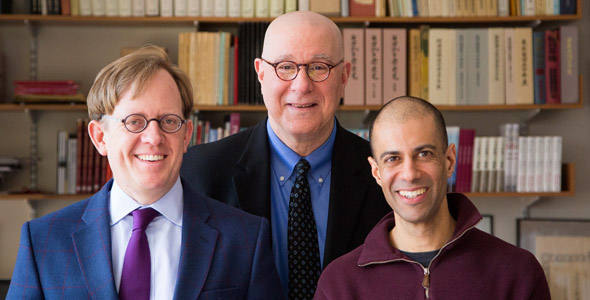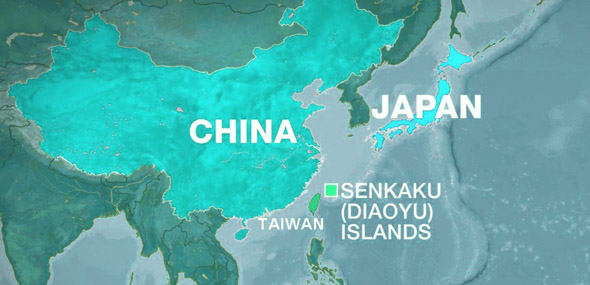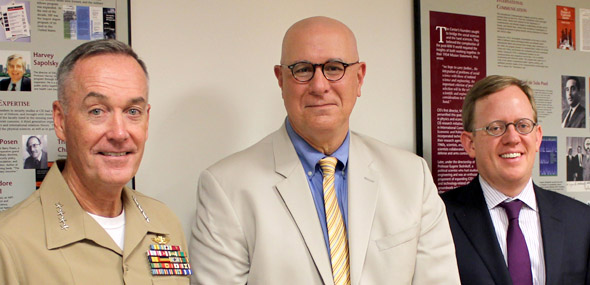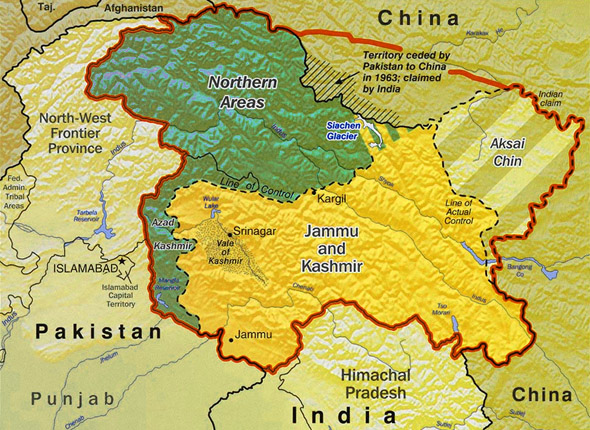Meet MIT's experts in Asian Security
Influential team counsels leaders, educates students, and informs policy

L to R: M. Taylor Fravel, Associate Professor of Political Science; Richard Samuels, Ford International Professor of Political Science and Director of the Center for International Studies; Vipin Narang, Mitsui Career Development Associate Professor of Political Science
MIT's Asian Security Studies faculty train the next generation of scholars and security policy analysts; counsel national security officials in the U.S. and abroad; and inform policy through publications and frequent contributions to public debates.
March 24, 2017
These are fraught times for scholars of security studies, perhaps even more so for those engaged with Asia. Just as the twentieth century was proclaimed “the American century,” many observers today speak of the twenty-first century as “the Asian century.” Yet the Asian strategic landscape holds many potential dangers including nationalist rivalries, changes in the distribution of power, and WMD proliferation.
“It’s a moment when our ideas, training, and teaching seem more relevant than ever,” says Vipin Narang, Mitsui Career Development Associate Professor of Political Science. “Given the uncertainties of the Trump administration’s foreign policy priorities, certain bedrock principles of American foreign policy that we thought were settled might not be, including a commitment to nuclear nonproliferation and U.S. alliances.”
Narang, who specializes in South Asian security and nuclear security, is one of three principal faculty members with MIT’s Security Studies Program who focus on Asia. He works alongside Richard Samuels, Ford International Professor of Political Science and director of the Center for International Studies, a specialist in Japanese national security, and M. Taylor Fravel, associate professor of political science, who studies Chinese foreign and security policies.
Described broadly, the core mission of the trio “is to understand how the states in the region conceive their grand strategies and military postures,” says Samuels. In pursuit of this goal, the Asian Security faculty train the next generation of scholars and security policy analysts; counsel national security officials in the United States and abroad; and inform policy, by publishing books and articles in scholarly and accessible journals and websites, frequently contributing to public debates on timely issues.
SHASS Communications recently had a conversation with Narang, Fravel, and Samuels about emerging security challenges in their domain, and opportunities for responding as scholars, public commentators, and teachers.
— • —
Q: What hot spots should foreign policy makers, and the rest of us, be focused on?
Samuels: There are three: China, China, and China. The balance of power in the region is shifting in China’s favor, and its rise and the measures it takes to provide for its security fashion the kinds of responses Japan and India — and the United States — make.
Narang: You can’t afford a trade war or a shooting war with China.
Fravel: The kind of great power competition you saw playing out in Europe in the 20th century is now starting to happen in Asia. So if you’re worried about the potentially devastating effects such competition can have, when the world’s greatest powers contend with each other and it gets violent, it’s much more likely to happen in Asia today than in other parts of the world.
Narang: It’s not just academic. There are active and ongoing conflicts with deep historical roots between China and Japan, South Korea and China and Japan, India and Pakistan, and you have an alley of nuclear weapons from Pakistan out to North Korea, which may expand.
Samuels: And a Japan and South Korea that could turn in that direction quite quickly.

Current conflicts in the East China Sea involve an ongoing dispute between China and Japan over the Senkaku/Diaoyu Islands, which are claimed by both countries.
"Territorial conflicts in the South China and East China seas have been escalating to high levels of tension. This matters to the United States because these conflicts involve U.S. allies, such as Japan or the Philippines, whom the United States is obligated to defend."
—M. Taylor Fravel
Q: What specific issues are of concern to you in your respective regions?
Fravel: There are territorial conflicts in the South China and East China seas that have been escalating to high levels of tension. These conflicts variously involve China and Japan in the East China Sea and Vietnam, the Philippines, Malaysia, Brunei, and Taiwan in the South China Sea. Each time one nation takes action to enhance its control of disputed land or adjacent waters, another state responds in a similar way that creates a vicious cycle. This matters to the United States because these conflicts involve U.S. allies, such as Japan or the Philippines, whom the United States is obligated to defend.
Samuels: Despite U.S. security guarantees, the Japanese feel insecure and vulnerable. They have highly capable naval and air forces, but their military doctrine has required them to commit to only the minimum use of force. That commitment is being strained by China’s rise and North Korean provocations, which is forcing a rethinking of Japan’s military posture. Prime Minister Abe visited the newly elected President Trump twice seeking reassurance on U.S. security commitments.
Narang: South Asia is an unfortunate test bed for how new nuclear powers behave. The conflict between India and Pakistan is heating up right now, just as both are expanding their nuclear weapons arsenals. The big change involves attacks across what both countries define as the Line of Control, a fenced off position in Kashmir which the other side’s forces rarely cross. But both sides have attacked across this line in recent months, in one case burning over a dozen Indian soldiers alive, another involving beheadings and holding soldiers’ families hostage India’s government has begun removing the restraints on retaliation, publicly crossing the Line of Control in response for the first time in over a decade. If the Pakistani attacks increase in intensity, India may not restrict its retaliation to the Line of Control. The U.S. needs to understand these tinderboxes, and figure out how to craft incentives for Pakistan to stop supporting militancy as a strategic asset of the state and how to address growing nuclear risks between the two nations
Samuels: And North Korea never goes away. Like a villain from central casting, it always seems poised to do the wrong thing — for its ally in Beijing, its neighbors in South Korea and Japan, and most of all, for itself.
Narang: China fears a collapse of North Korea and the threat of refugees more than it fears its nuclear weapons. This problem can’t be solved unless the U.S. and China agree on a playbook.

L to R: General Joseph Dunford Jr., United States Marine Corps, Current Chairman of the Joint Chiefs of Staff; Richard Samuels, Ford International Professor of Political Science and Director of the Center for International Studies; M. Taylor Fravel, Associate Professor of Political Science
"My colleagues and I have briefed the chairman of the Joint Chiefs of Staff, and the MIT Center for International Studies runs an annual program, Seminar XXI, for mid-career military, intelligence and NGO officials, which draws heavily on SSP faculty and has had enormous impact."
—Richard Samuels
Q: How do you see your role in helping keep the peace, or at least bringing understanding to issues in a way that doesn’t contribute to the volatility?
Fravel: I participate in several regular dialogues with U.S. and Chinese experts, which try to develop recommendations for our respective governments. I also speak regularly with Western media to help them understand the stakes and dynamics in these disputes and am active on Twitter. Beyond my public engagement, I’m working on a project that explores ways to defuse tensions in the region’s territorial and maritime boundary disputes. For instance, the South China Sea is the perhaps most overfished fishery in the world, and fisheries competition elevates the importance of maritime claims. A joint fishing or environmental protection agreement among the claimants could lower the importance of claims to the islands and adjacent waters and thereby decrease tensions and the potential for conflict. I’m also finishing a book tracing the evolution of China’s military strategy since 1949, from being defensively oriented to acquiring increasingly potent offensive capability. Spinoffs of this research might offer policymakers a framework for assessing how China’s military strategy may change in the future.
Narang: I have regularly written on the India’s nuclear doctrine in its leading English language newspapers. I recently published a longer-form piece on how surgical strikes across the Line of Control could lead to a larger conventional war between India and Pakistan. Also, with my colleagues, I participate in government-sponsored exercises and dialogues intended to remind their national security establishments what’s at stake in these conflicts. As subject matter experts, we provide specific assessments and reality checks in the scenarios, and they get to see the results of their decisions and just how quickly things can spiral out of control.
Samuels: We are all engaged in public discourse and are committed to trying to improve it. For instance, I have worked with the Aspen Institute to connect members of Congress with their Japanese and Korean counterparts. My colleagues and I have briefed the chairman of the Joint Chiefs of Staff, and the MIT Center for International Studies runs an annual program, Seminar XXI, for mid-career military, intelligence and NGO officials, which draws heavily on SSP faculty and has had enormous impact. There is a competition among Pentagon employees and service branches for joining the seminar—usually at the level equivalent to Lt. Colonel in the Army. Many become flag officers, and a disproportionate number have become chiefs of staff.
I spend as much time talking to Japanese media and government officials as I do to the American media and officials. When they seek me out, it’s for help to interpret U.S. policy, and when I seek them out it’s to understand Japan’s. Two years ago, the Japan Ministry of Foreign Affairs gave us a $5 million gift to endowment to support our research on Japanese politics and diplomacy. This is helping fund our graduate students, a principal research scientist who focuses on the Asian military balance, and my own project on the history of the Japanese intelligence community.

The areas in green are the two Pakistani-controlled areas: Gilgit–Baltistan in the north and Azad Kashmir in the south. The area shown in bright yellow is the Indian-controlled state of Jammu and Kashmir and the diagonally-hatched area to the east is the Chinese-controlled area known as Aksai Chin.
"The conflict between India and Pakistan is heating up now, just as both are expanding their nuclear weapons arsenals. The big change involves attacks across what both countries define as the Line of Control, a fenced-off position in Kashmir which the other side’s forces rarely cross."
—Vipin Narang
Q: What part does teaching play in your mission?
Narang: Our graduate students are grounded in political science as a discipline, and engaged with contemporary issues and problems. MIT is one of the few places where young scholars are actively encouraged to engage with the policy community.
Fravel: This is distinctively MIT. Many political science departments shun direct engagement with policy makers or downplay applied research. And there’s not another academic department or research center at a major research university that has in one place expertise on security issues involving China, Japan, and India – the major powers in the region. So if you’re interested in any one of these countries, or their interactions with each other and the rest of the world, MIT is an attractive place to be a graduate student.
Samuels: We take our role of being public intellectuals very seriously, so this means that all of us, including graduate students, publish regularly in accessible journals, such as Foreign Affairs, The National Interest, and policy relevant blogs, in addition to producing more scholarly work. Our current graduate students, almost all of whom are women, remarkably, are publishing on topics from Chinese nuclear, space and cyber strategies, to U.S.-Japan alliance politics. And one graduate of our program, Eric Heginbotham, has returned to MIT from the RAND Corporation, and is publishing influential articles on Chinese and Japanese military and intelligence issues.

"We take our role of being public intellectuals very seriously, so this means that all of us, including graduate students, publish regularly in accessible journals, such as Foreign Affairs, The National Interest, and policy relevant blogs, in addition to producing more scholarly work."
— Richard Samuels
Q: Do you have any final thoughts about your work at the start of this new political era in the U.S.?
Narang: Early in presidencies is when foreign actors and adversaries tend to test administrations to see how they will react. Our role as policy-engaged academics is to frame debates, provide information based on areas of expertise and insights to help avoid mistakes. That’s what I hope we can do.
Fravel: The greatest challenge for all of us is uncertainty, and what might happen if a crisis or incident occurs in the region that engages U.S. interests and demands a response. The Asia policy (and broader foreign policies) of the Trump administration remain uncertain and could go in several different directions. At the same time, China will be selecting a new Politburo Standing Committee this fall. South Korea will soon have a new president. It’s more important than ever to be engaged publicly on the security issues in Asia, to help the public understand the issues at stake for states in the region and for the United States.
Samuels: We’re here to help.
Suggested links
Asian Security Research | MIT Security Studies Program
Richard Samuels: Profile/Media/Publications | Story
M. Taylor Fravel: Profile/Media/Publications | Website | Article in MIT Press Journal
Vipin Narang: Profile/Media/Publications | Video | On the US/Iran Deal
Chairman, Joint Chiefs of Staff, General Joseph Dunford Jr.
Archive Stories
Samuels
Sizing up Japan, after the disaster
MIT political scientist Richard Samuels examines Japanese stasis after nuclear meltdown at Fukushima.
Samuels receives the Order of the Rising Sun, Gold and Silver Star
Japanese government honors political scientist for significant contributions to scholarship and promoting friendly relations.
Think and act globally, Samuels tells new students
"The central challenge for MIT is to continue to anticipate and to stay 'ahead of the future.' And that future has even less respect for national borders than the past."
Fravel
MIT political scientist awarded prestigious Carnegie fellowship
Fravel will examine Asia’s maritime conflicts in further depth.
Fravel advises U.S. government officials on South China Sea disputes
Fravel decodes China’s foreign policy
A political scientist analyzes the decisions of a world power.
Narang
The varieties of nuclear strategy
In a new book, political scientist Vipin Narang examines the multiple political uses of nuclear weapons.
The U.S.-Iran nuclear deal: MIT’s experts size it up
Faculty and specialists weigh in on potential pact and global implications.
After the U.S. leaves Afghanistan, then what?
Vipin Narang examines the implications of the military drawdown for regional rivals India and Pakistan.
Story prepared by MIT SHASS Communications
Editorial Team: Leda Zimmerman, Emily Hiestand
Photographs of MIT Professors: Jon Sachs, MIT SHASS Communications
Photograph with General Dunford: Laura Kerwin, MIT CIS
